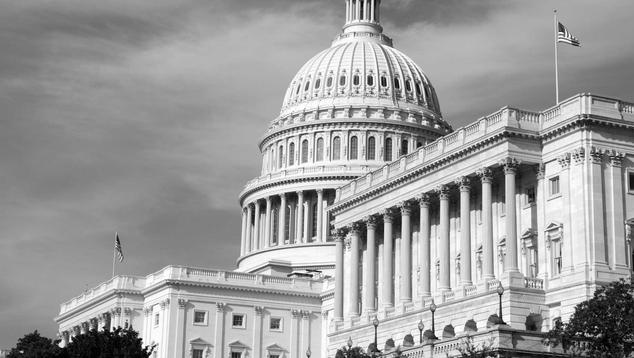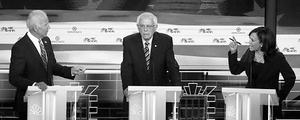The American public's broad concerns about the role of the federal government in their lives have evolved into, I believe, the most important issue in our current political environment. Debates over the role of government have defined the American Experience going back to the nation's founding -- but now more than in previous eras, these debates have become the underlying, critical focal point of the next presidential election.
An excellent recent review of public opinion data on Americans' views of their government, "The Polls -- Federal Government Power" by Robert W. Oldendick of the University of South Carolina and Stephen E. Bennett of the University of Cincinnati, helps refresh our understanding. Their piece, published in Public Opinion Quarterly, the journal of the American Association for Public Opinion Research, underscores the public opinion reality of the "Government Paradox" -- the finding that although Americans are worried about too much government power, they appreciate and welcome government-provided services.
As Oldendick and Bennett conclude:
The public expresses concern about the federal government's power -- a concern that has increased over the past decade -- and it consistently believes that the government is too involved in people's daily lives. When it comes to the issue of provision of services, however, the public is much more evenly divided. Despite concerns that the "government is getting too powerful," a significant segment of the public generally feels that government should provide more services.
This paradox is humorously exemplified by the oxymoronic admonition: "Keep your government hands off my Medicare!" In a review in March, I pointed out that Democratic presidential candidates were underscoring the complexities of the situation by calling for more government while at the same time talking about how much government needed to be fixed.
Agreement That Government Needs Reforming
Political candidates vying for the 2020 Democratic nomination have indeed approached these issues of government power and government services from many different, and sometimes contradictory, angles. But it's important to note as a starting point in any discussion the remarkable agreement on all sides that the government needs reforming, albeit significant disagreement on exactly how that reform should be carried out.
-
The Democratic presidential candidates' negative views of government stem from their conviction that government is controlled by corporations, the wealthy, lobbyists, PACs and so forth -- and that reform means wresting control away from these special interests. Democratic candidate Elizabeth Warren, for example, says: "Washington works great for the wealthy and the well-connected, but it isn't working for anyone else. Companies and wealthy individuals spend billions every year to influence Congress and federal agencies to put their interests ahead of the public interest." Candidate Bernie Sanders echoes these sentiments, saying: "The era of Wall Street billionaires controlling our government and elections must come to an end, and we must take back our democracy for the American people." Front-runner Joe Biden, himself a part of the federal government for over 40 years, says: "Wealthy special interests, corporations, and foreign influences are skewing the policy process in Washington in their own favor."
-
President Donald Trump and other Republicans' negative views of government are based on the conviction that it is illegitimately controlled not by outside interests, but instead by entrenched, inside, "deep-state" interests -- and that the evildoers and bad players are the government itself. Three years ago, Trump called for "draining the swamp," and he and other Republicans have continued their focus on allegations of the negative impact of embedded bureaucracies that are thwarting the people's will. Trump has attempted to pull back on government power in many ways; his re-election website claims he is "following through on his promise to drain the Washington swamp and make the Government accountable."
-
The people of the country, for their part, just have a dim view of the federal government in general. "Government" is usually the top category when we ask Americans each month to name the most important problem facing the country. And a new Gallup update of Americans' views of U.S. business and industry sectors shows that the federal government gets the lowest positive rating of any of the 25 entities tested.
Government Power vs. Government Services
But, of course, even if the government is reformed, there are major underlying differences between President Trump and the Democratic presidential candidates concerning exactly what it is that the government should be doing. Trump, mirroring the views of rank-and-file Republicans across the country, wants the government to have less power; Democratic candidates want it to have more.
This disagreement in essence defines the public opinion paradox as outlined in the Public Opinion Quarterly review. The American public in many ways agrees with both sides -- the government has too much power in the abstract, but the government should increase its power to provide more services when it comes to specifics.
Research we conducted a few years ago showed that 49% of Americans agreed that the federal government represented "an immediate threat to the rights and freedoms of ordinary citizens." When asked to explain that position, the top four categories of answers (all mentioned by 10% or more) focused on concerns that the government is too big and has too many laws, concerns that the government violates freedoms and civil liberties, concerns about gun control and violations of the Second Amendment, and general feelings that there is too much involvement of the government in people's private lives.
Other concerns include government intrusion in efforts to control gun ownership, as well as opposition to the Affordable Care Act based on views that the individual mandate constitutes unwarranted government intrusion into Americans' personal decision-making.
But we have many examples of instances where the public evinces positive reactions to what the government is doing.
-
Americans have more confidence in the U.S. military than in any other institution tested.
-
Americans depend on government-funded Social Security more than any other source of retirement income.
-
Majorities of Americans rate a number of federal government agencies as "excellent" or "good," including the U.S. Postal Service (topping the list, with a 74% positive rating), Secret Service, CDC, CIA, NASA, FBI, Homeland Security and FEMA. In fact, in our most recent update, all of the federal government agencies tested (including Veterans Affairs, at the bottom of the list) get more "excellent/good" ratings than they do "poor" ratings.
- Americans overwhelmingly favor increased government spending of as much as $1 trillion on infrastructure.
-
Research reviewed in the Public Opinion Quarterly article shows that in at least one recent national survey, a slight majority of Americans say they would prefer a bigger government providing more services to a smaller government providing fewer services.
Presidential Candidates Fail to Acknowledge Both Perspectives
As we have seen, a defining aspect of U.S. public opinion is Americans' ability to simultaneously hold the views that government provides important benefits and that there is too much government intrusion in their lives. These views may seem divergent but are not necessarily contradictory. Americans are in essence seeking a "sweet spot" in what the government does -- just enough, but not too much. Like many aspects of politics, the optimum result for the role of government is no doubt a compromise and a solution that takes into account both sides of philosophic disagreement.
Politicians and presidential candidates have yet to fully address the nuances of these complicated attitudes, given their firmly held convictions that they have the truth and their opponents do not. Politicians are thus missing the opportunity to more successfully relate to the concerns of the public at large.
Trump and the Republicans fixate on limiting government services and regulations, and don't talk much about the positive value of government services (with the exception of extolling the virtues of the government's Border Patrol, ICE and the military).
The Democratic presidential candidates, on the other hand, advocate expanding the spectrum of services the government provides and increasing government oversight and regulation, calling for the use of more government power in healthcare, education, providing jobs for workers, reducing industrial and automotive emissions, controlling Wall Street and big corporations, and so forth. But, just as Trump and the Republicans don't talk about the things the public perceives the government does well, the Democratic presidential candidates tend to not talk about the public's significant wariness about the excesses of government and concerns about too much use of government power.
If things continue as they are, government could (and should) end up being a major topic of concern in the general election debates next September and October. Candidates should be asked to address both the good and the bad about government, and to discuss what it is they would do to address all aspects of the public's complex views of the federal government, its power and the services it provides.




